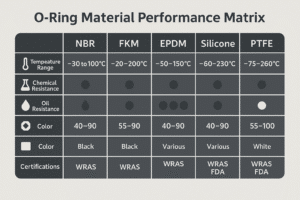Struggling to match an oil seal without a clear label? Whether you're handling a smudged number or a sample with no ID, finding the right seal can feel like searching for a needle in a haystack.
You don’t need to guess. With the right measurement or a partial code, I can walk you through two foolproof ways to identify oil seals and avoid mismatches.
What information is needed to identify an oil seal?
You can identify an oil seal using either its part number or by measuring its dimensions.
- Part Number: Check for printed or engraved codes like “90311-47027.”
- Dimensions: Measure ID (shaft size), OD (bore size), and width using a caliper.
| Term | Description |
|---|---|
| ID | Inner Diameter (shaft fit) |
| OD | Outer Diameter (housing fit) |
| Width | Overall seal thickness |
Explore our oil seal product range for matches in standard sizes like TC 25x40x7 or custom sizes.
How do I identify an oil seal using its part number?
If your seal still has visible markings, use them to cross-reference.
- Look along the outer edge or sidewall for printed codes.
- Search OEM numbers like “TOYOTA 90311-47027.”
- Use online catalogs or message us directly.
We often match references like:
- 90311-47027 ➜ Toyota Oil Seal Replacement Guide
- TC 25x40x7 ➜ Standard TC Seals
What if there’s no part number—how do I measure the seal?
If there's no visible marking:
- Clean the seal thoroughly.
- Use a digital caliper for precision.
-
Measure:
- Inner Diameter (ID): hole where the shaft goes
- Outer Diameter (OD): outer edge to fit housing
- Thickness (Width): overall depth of the seal
Example:
If your caliper reads 29.9 mm ID, 47.7 mm OD, and 7.0 mm width, it’s likely a 30x48x7 seal.
Need help? Snap a photo beside a ruler and send it to us—we’ll match it for you.Here’s how to install your matched oil seal correctly.
Can I cross-reference oil seals from different brands?
Yes, most oil seals follow standard sizing systems, and we provide cross-reference support.
We match part numbers across major OEMs and brands:
| OEM Number | Equivalent Size | Type |
|---|---|---|
| TOYOTA 90311-47027 | 47x70x10 | TC Double Lip |
| VW 038 103 085C | 40x56x7 | Rotary Shaft Seal |
| NOK TC 30x48x7 | 30x48x7 | TC Oil Seal |
Learn more about oil seal types and equivalents.
Is it safe to use a slightly different oil seal size?
Usually not. Even small deviations in ID, OD, or width can lead to leakage or misfit.
- ID off by 0.5 mm? Risk of poor shaft seal.
- Width mismatch? You might compress or misalign components.
Stick with exact matches. If in doubt, contact us and we’ll verify compatibility.
Do I need all three dimensions to match a seal?
Ideally, yes. But you can start with what you have.
- Just an OD? We’ll narrow down matching specs.
- Partial width or worn ID? We can estimate based on standard sizes.
Still unsure? Send us photos and we’ll do a manual cross-check within hours.
Conclusion
Finding the right oil seal doesn’t have to be a guessing game. Whether you have a faded number, partial size, or no clue at all—there’s always a way to get the perfect match.
Need help identifying your oil seal?
📧 Email: [email protected]
📱 WhatsApp: +86 17622979498
Send us part numbers, sizes, or photos—we’ll match it quickly and accurately.
Related topic
- TC Oil Seal: Structure, Specs & Uses
- FKM vs NBR: Which Oil Seal Material to Choose?
- How to Install Oil Seals Correctly



